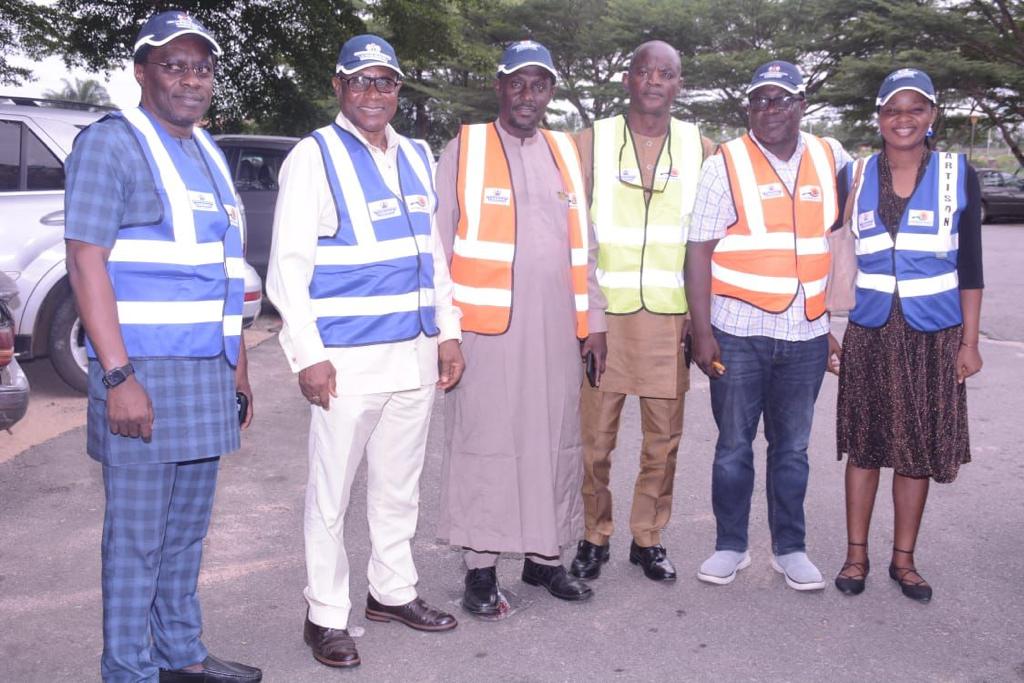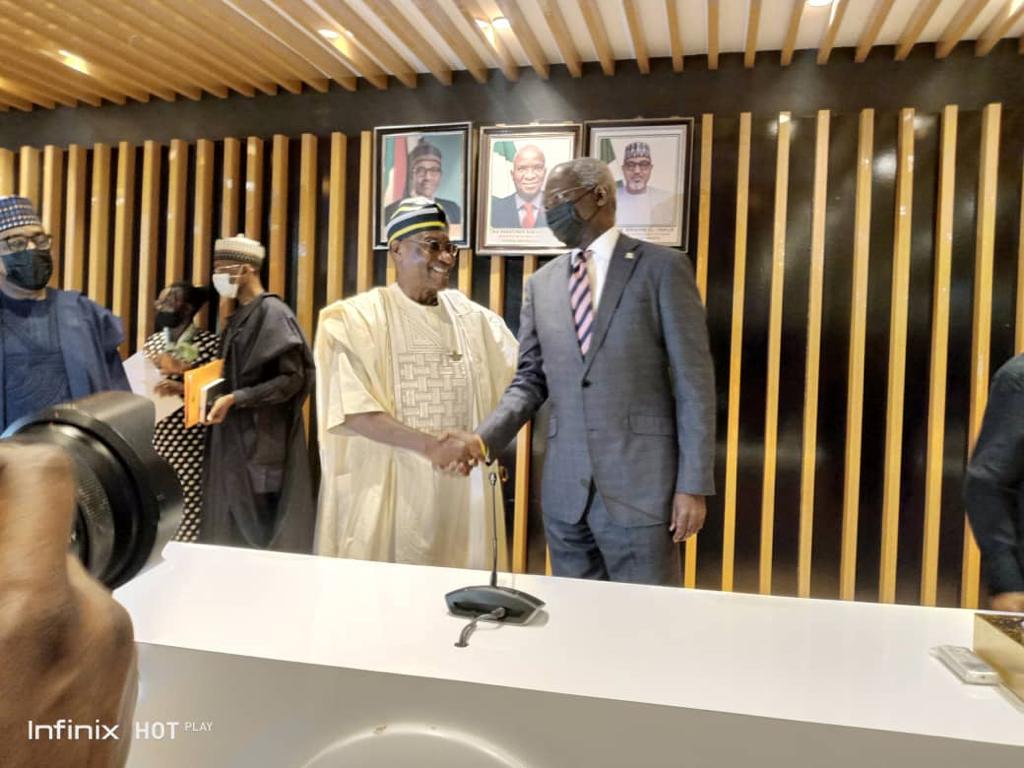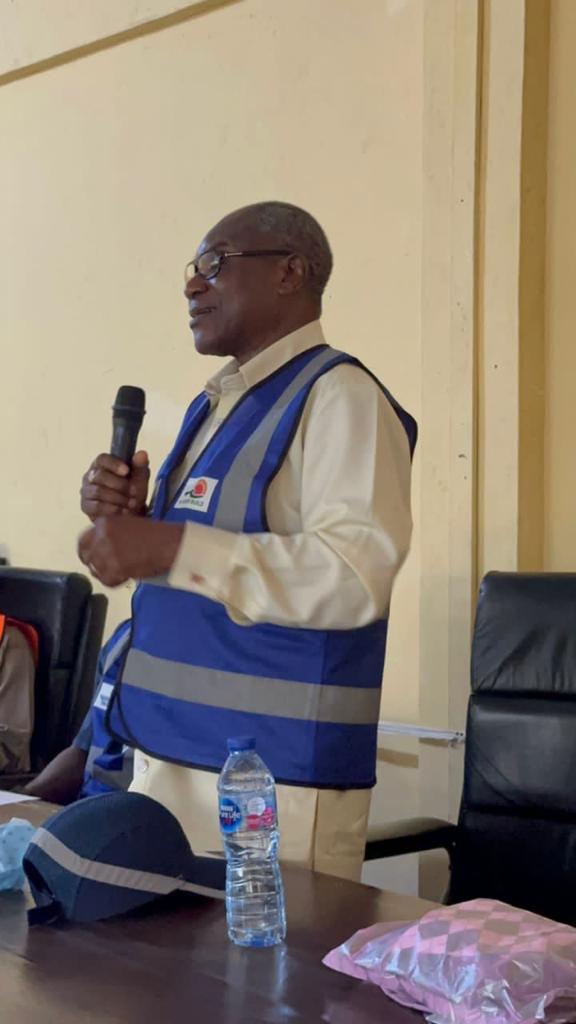Why buildings are collapsing in Lagos, by Chairman, Builders Council, Dr Opaluwah

Key Points
- Five reasons why buildings collapse in Nigeria, not only in Lagos
- Many developers engage unqualified persons to build houses for them
- Architects take on the responsibilities of builders, though they are not trained builders
- Why foreign nationals are taking over artisan trade in Nigeria
- CORBON is collaborating with American institution to train artisans
By Daniel Adaji
Dr. Opaluwah Samson is the Chairman of the Council of Registered Builders of Nigeria (CORBON) and Group Chief Executive Officer of Khariz Group. In this interview, he bares his mind on the spate of building collapse in Nigeria.
We have been following the trend of building collapses in the country for sometimes now, especially in Lagos State.Why are we seeing more collapses in this era of proliferation of modern estates?
Thank you very much. It is indeed true that we are having resurgence in building collapses in this nation, more than we had experienced in the past. The explanation is simply that we are also putting up more buildings now than we did before. There is a huge demand for houses in the country so many private developers are trying to meet that demand. But having said that, next part of the question is why the increase in collapse?
People brazenly disobey laws
Simple. The increase in collapse is occasioned by the impunity we are experiencing in all facets of life in Nigeria. People brazenly disobey laws. They brazenly do not obey conventions. People disobey and they have no respect for professionalism, expertise. And they go ahead to do what they like. That is why buildings are collapsing.
What pattern have you discovered in collapses of buildings? Are they new or only aged structures?
Well, let me say that we have experienced buildings in construction, under construction collapsing. We have also experienced aged structures that ought to have been put down or maintained collapsing due to lack of maintenance. And in some occasional situations, we have found unauthorized change of use as being responsible for the collapse.
What does it say about the standards in the building sector?
Building standards have not changed and the standards that have been applied as it specified in the various areas of infrastructure development in this country are of international standard.

Site of a collapsed building. Photocredit: Online
We started with the British standard and most of what we do even with the Nigeria standard is congruent with the British standard. We have the national building code, which is a code that identifies every element of the building development ecosystem and these standards are the same everywhere in the world. What changes is, perhaps, the extenuating conditions, weather situations locally in the areas that will require some adjustment to be done, but centrally the principles of building and the standards are the same anywhere in the world.
While you were talking, you talked about changes in weather conditions as one of the factors responsible for collapse of buildings?
In this country, we are fortunate. We don’t have extreme weather situations. We don’t have too many seasons. We only have raining and dry seasons and even these raining and dry seasons the temperature variation is not much. You find out that we don’t have that challenge like countries that can go up to -15 and then rise up to +35/40 degree Celsius. The same country and the same environment but it is not like that with us. We don’t have that temperature or climate variation that would warrant revision of the code. What we have is simple good stable climate that support all year round temperature range that doesn’t vary more than10/15 degree Celsius.
Temperature range, as experienced in the country, does not adversely affect construction
That is fantastic by all standards so we can’t say because of that, we’ve had collapses because that temperature range, as experienced in the country, does not adversely affect construction.
How does your organization sanction erring builders?
We have the Builders’ Registration Act CAP B (13) laws of the Federal Republic of Nigeria (2004). That is the law that set up our Council. It mandates us to register builders; those who have been adequately trained. We assess them in accordance with the law to be experts and are competent enough to be given the recognition as professional builder. Then it mandates us to regulate the practice of building technology in its entire ramification in the country.

We have about five clauses under section 1(1) which is what tells us what to do and where we derive our powers from. Now, all these buildings that have collapsed, we have not found any builder culpable. Rather, what we have found is that the developers have gone ahead to raise buildings without engaging builders who are trained to construct buildings.
If we find any member of the organization culpable, we call him/her before the tribunal for trial
But having said that, let me also say that the law under which we operate has given us a tribunal, that’s Builders Tribunal. If we find any member of the organization culpable, we call him/her before the tribunal for trial. If found guilty, sanctions are meted. The tribunal has the power of a high court.
Now that every architect is a builder, what are you doing about it? Does it affect standards?
It is an abnormal situation, where you (architect) are trained for designing, allocation of space, presentation of form, but take over the management of the production process on the site. That is the builder’s territory. It will interest you to know that the university I attended, the Ahmadu Bello University, Zaria’s Faculty of Environmental Design, where I completed my course, has both Building and Architecture. In our time, both of them had common Year One, but branch off in the Second Year. That’s where the commonality ends. Now, if somebody studies a different thing for another four years, then they begin to trade places, then something is drastically wrong. It is also not possible for you to learn

Dr. Opaluwah with Federal Minister of Works and Housing of Nigeria, Raji Fashola
Architecture for five years and be competent in Architecture and in what the builder has learnt for the same five years that you were all together in the same campus. I consider it one of the aberrations of our system that people are doing what they are not expert at doing.
It is just like saying because I know about something, I can be called out to carry out that duty, but there is a training that is underpinning that particular area and if there were no differences, even in the university and polytechnic system, the authorities would have merged the. Why is it that it is in the practice that this is happening? It is an aberration that we are allowing to mature and the nation is the worst off because we are seeing the consequences already.
Do we have so many building collapses in the other parts of the world?
Well, let me say that building collapse is like every accident in history. There is a possibility that anything can happen. So accidents happen all over the world; we have building collapses for one reason or the other. Anywhere humans are, we are not infallible. Once in a while, and we make mistakes.
China does construction faster than we do, but records few collapses. What can we learn from them?
China is a closed society; so I know they have fast construction, but you may not know the level of failure. China is a nation that is developing infrastructure at a very rapid rate and it is an encouragement to those of us in the developing countries that we can change our story. The changing of our story requires the changing of our mindset.
The moment we decide that we want to solve our problems and challenge ourselves to move from one stage of development to the other we will beat China. We have the capacity, the competence and the zeal and the drive.

What we need now is an enabling environment; the push by the political authorities to say ‘let us arise and do something’, and you will see that Nigerian professionals will rise. In the building industry, Nigerians have not participated as they ought to.
No foreigner will ever build your country for you. They are merchants.
They come to trade and a trader wants profit. A trader, unless he is very God-fearing, is not interested in the long term benefit that you derive from what he’s selling to you. For example, look at what just happened in Ukraine and Sudan.
If we are not given the opportunity to learn, we can never be perfect
Everybody sent aircraft there and pulled out their citizens. It shows that when the chips are down, it is only your people that you have. So when we begin to value outside technologies, we leave our own people on the street. They are qualified, but no jobs and yet we say they have no experience, or they are not good. When the chips are down all these people we are patronizing will leave. What is going to have to Sudan now? Will their whole system crumble now? And when the war is over won’t they rebuild? But everybody has pulled out of Sudan; that is what I mean by the political leadership, they must give a drive to make Nigerians develop Nigeria and they must be ready to accept Nigerians’ mistakes because we learn from experience. And then if we are not given the opportunity to learn, we can never be perfect.
What role does the Standard Organisation of Nigeria (SON) play in dealing with building collapse?
There are five reasons why a building will collapse. The Standard Organisation of Nigeria (SON) comes in under one of the reasons why a building will collapse, and that are regulation. The construction site is a regulated environment. You regulate the material (this is carried out by SON); you regulate the personnel (that is the professional bodies that are involved and the practice itself) and the production methodology and practice are also regulated. The materials are regulated by SON. There is specification for every material. For instance, you are not supposed to use any water in production that is not potable.
What are the reasons why we have collapses?
It could be governance failure; and by governance I mean no body will go and build a house without planning approval unless you are a criminal. That is an immediate offence. If you are going to build a house, you must go to the guided authority and ask them for approval and they are going to give you specifications. Your architectural drawings,, your builder’s document, which we call builders practice tool, and the like.. If they didn’t check these and just stamp the document, there will be a possibility of a collapse.
Then there is a question of sanctity of human life. The constitution guarantees the right to life in Nigeria, so we should not go and assemble people to carry out a function for you, like in building construction without making sure that they are safe, or working in an environment that their lives will not be safe. Government has a duty to make that environment safe to work.

There is a question of people who contravene the rule on governance. There have been recent collapses, have you heard of any sanctions? All we hear is that they shut down the site?
There is corporate governance. The organization that is building the house should be held liable for any accident in the site.
Technical: Anything could go wrong with the design. If there is an error in the design and it is not picked at construction, it could lead to collapse, but this is very rare. It is very rare because design by its nature is not done and carried out by one person. There must be cross-referencing. There must be some level of supervision so it is most unlikely for a design error to cause collapse.
Another reason under technical is that during construction the wrong technology is applied, the wrong people carry out the building project, wrong decisions being taken and it is possible that the design is not implemented as designed. Most of the collapses during construction are as result of these. When you put incompetent people, those who are not licensed to do what they are doing and don’t know the underpinning reasons for decisions that should be taken on a particular site, they just assume they know but they don’t really know and make mistakes.
Another reason is modification in use. A building has been designed for residence, the designer has some assumptions that human beings are going to live there and the weight for human being are factored into the design. Then, suddenly, the area has become commercialized and then you lease out for commercial use and leased to a factory. The building is not designed for the factory. Machines will be brought in, both static and dynamic loading as a result of equipment that has been installed. The next thing is cracks will begin to appear and then there is collapse.
Abuse or miss-use of facility. Not using the structure responsibility. If a building has been designed for static loading and you went and introduce dynamic loading, you are abusing the structure. Or the example I give that makes people laugh is that you are on the fifth floor of a building and then because you come from a part where they grow yams a lot, every morning afternoon, evening, you are pounding yam on the fifth floor. In a very short duration and continuously over time the structure will be damaged. It’s the same thing with institutional buildings that are being converted to factories and other uses. Sometimes, the people also modify private residences with commercial and in that case to give the ambience of commercial development, they remove structural metals to create space; it leads to collapse.

The fifth reason is what nobody has control over and that is what we call an act of God. If suddenly there is an earthquake in Abuja, you cannot blame us. But if earthquake happens every five years, then we design for it.
What has training got to do with what we are experiencing?
Building is physical science. Training has a lot to do with it. Everyone, right from the artisan up to the project manager, must be trained and licensed to do what they do. Artisans need to train in two directions: formal and informal or non-formal. Non-formal, because they are not following the formal way, and the informal as a result of contact with the industry, they begin to acquire some knowledge. So it is not as if they purposely came in to begin to learn.
The formal must go through craft school where we produce artisan Grade 1-3 and after craft school, you move to technical school for another three years and, by the time you finish from technical school, you are a technician Grade Two. For the informal or non-formal, they go to Grade Test 3, 2, 1. The higher is the lower. As you get more competence, you get a lower figure. With these, you can now gain some technological knowledge.
The informal sector ran into trouble because the management of the system became corrupt and people now paid for certification
At craft school, some enter the economy, others enter from technical school. Because all this thing that you must become, an engineer or technologist; if you stop as expert capital, you begin to grow and develop your competence, you are okay. Those who still want to further in the formal sector go to the polytechnic or proceed to a higher national diploma which is now equivalent with those who went through WASCE to earn a degree.
The informal sector ran into trouble because the management of the system became corrupt and people now paid for certification. So you find someone holding Trade Test 1 and cannot do a simple job. That is why we have other artisans coming from other West African countries to take our place. It is not lack of patriotism. The client wants work to be done, and if you don’t have the competence to meet his need, he will pay whoever is competent. It is our own system that causes this problem and we have to find a way to address it.
CORBON is now the sector’s skill council on construction training. We have begun to train artisans and license them.
Currently, we have a national operational standard, which is the syllabus for the non-formal sector. Those standards are standards of competence. We have that for trades like, building, masonry, carpentry, welding, iron bending and we are developing more.
We are going into aluminum works. We have concluded works on fabrication and a number of them. We should be rolling out again about four before this year runs out so that we have at least 10 trades. But there is still a lot to be done. That is for the informal council. Because we are sector’s skill council on the National Board for Technical Education we are able to train informally too.
The Federal Government N-Power Scheme has helped us to train artisans in the building trade and enable us to deepen our structure. We have the structure to train through the informal route which is called National Skills Qualification framework, now as approved by the Federal Executive Council throughout the country all year round. We have trained over 50,000 persons throughout the country and we are expecting that as soon as the incoming government settles down, we will present a proposal to train one million because 50,000 is a drop in the ocean. By the time we give skills to one million young Nigerians that will work with their hands in the construction trade, unemployment will be averted, especially at the grassroots. And for the formal sector, we are in partnership with the National Universities Commission (NUC) and the National Board for Technical Education (NBTE). We visit the polytechnics; we also visit the universities to accredit their programmes. That is what we are doing in training.
We have agreed just today by the members of my council to bring in builders who are in practice for refresher in current technology of concrete casting on sites. Before the next two months we will be calling them round the country in the various geopolitical zones and giving them the current direction that concrete technology is going. We are in partnership with American Concrete Institute and we have new technologies that we want to deploy. We want our members to be the best and be current.
We know that despite the infrastructure challenge in Nigeria, there is a huge demand but there is going to be more international demand. We want to interest the Nigerian youths. We are not happy that there are wars all over the world but when the wars are over, there will be need to rebuild and they will begin to require technical skills. If we give our people skills we will export them there.. That is one of the gains of our partnership with the American Concrete Institute. If you hold that certification, you can go anywhere in the world to work in concrete area.
What would you want Nigerians to know and what precaution should be taken?
Every Nigerian who values these rare resources should not waste it. What do I mean by wasting it? Wasting is if you are going to engage in a construction project, particularly building, follow the rules. Engage competent builders to build your house. If you want to build a house, engage a builder. It is as simple as that.
Secondly, every Nigerian should insist that anybody who is putting himself out to build for them tell them “how are you going to build this house?” We have tools for building and when we talk about tools, our artisans have the physical tools; trowels, hammer, welding gun etc. But we who should superintend over them also have our tools, which are the construction programme and schedule of works, the construction methodology and technology, the project health and safety plan, the project quality management plan; all these are things you should look out for.
Building is an professional enterprise. There are people who are into the business of construction; they are called contractors. They may not study Building, but those who build the houses are builders. So, they shouldn’t make the mistake of thinking that a contractor is synonymous to a builder. A builder can be a contractor, but a contractor may know next to nothing about building. He may just be a financier of a business of building. So that is my advice to Nigeria.
Somebody may say how many are you (builders) and I will ask them the same question, even if there are only two doctors in Nigeria will you allow a lab scientist to operate on you? That is the question and we are enough to service the country and we are producing more.
The fact is we have what we call the triangle of practice: one builder manages about four technologists. One technologist manages about six assistant technologists and each of the six assistant technologists can manage about 30 artisans. The important thing is that let the expertise be deployed to the various project sites and we are all over the country.
Let me add that building is a multidisciplinary activity. The architect has his role, engineers have their role. The engineers come in different genre: we have the service engineer, the structural engineer, etc; all of them come in differently. What the builder does as the manager of the building site is to collate all these inputs to build the structure and the architect ensures, since he is conceived this dream as his client desired, he is to guide and ensure that what the client wants is delivered. We all work together as a unit. The object is to produce a completed, habitable and structurally-sound building, but everybody has got his own roles to play.
If we respect our boundaries, there will be no collapse; and if we do what we are paid to do and licensed to do there will be no collapse. For every activity on the construction site, there is a regulatory body. Anybody who crosses his boundary is operating in a territory that he is not supposed to and it can create problems.
The Insight Report
Nigeria Coverage



